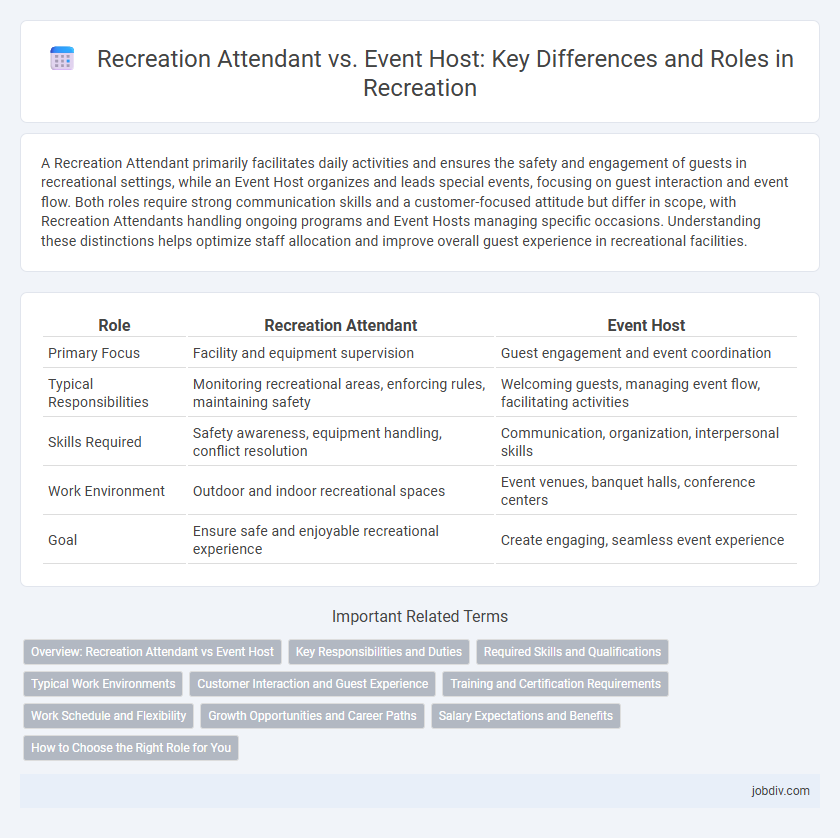A Recreation Attendant primarily facilitates daily activities and ensures the safety and engagement of guests in recreational settings, while an Event Host organizes and leads special events, focusing on guest interaction and event flow. Both roles require strong communication skills and a customer-focused attitude but differ in scope, with Recreation Attendants handling ongoing programs and Event Hosts managing specific occasions. Understanding these distinctions helps optimize staff allocation and improve overall guest experience in recreational facilities.
Table of Comparison
| Role | Recreation Attendant | Event Host |
|---|---|---|
| Primary Focus | Facility and equipment supervision | Guest engagement and event coordination |
| Typical Responsibilities | Monitoring recreational areas, enforcing rules, maintaining safety | Welcoming guests, managing event flow, facilitating activities |
| Skills Required | Safety awareness, equipment handling, conflict resolution | Communication, organization, interpersonal skills |
| Work Environment | Outdoor and indoor recreational spaces | Event venues, banquet halls, conference centers |
| Goal | Ensure safe and enjoyable recreational experience | Create engaging, seamless event experience |
Overview: Recreation Attendant vs Event Host
Recreation attendants primarily manage and maintain recreational facilities, ensuring safety and enjoyment for participants during activities such as sports, swimming, and fitness programs. Event hosts focus on organizing and facilitating events, coordinating logistics, and engaging guests to create memorable experiences at social gatherings, corporate functions, or community celebrations. Both roles require strong interpersonal skills but differ in the scope of responsibilities, with recreation attendants centered on activity supervision and event hosts on event execution.
Key Responsibilities and Duties
Recreation Attendants are primarily responsible for maintaining safety, organizing equipment, and assisting participants during recreational activities, ensuring a smooth and enjoyable experience. Event Hosts focus on managing guest interactions, coordinating event logistics, and facilitating communication between vendors and attendees to ensure event success. Both roles emphasize customer service but differ in operational scope and event-specific coordination.
Required Skills and Qualifications
Recreation attendants require strong interpersonal skills, basic first aid knowledge, and the ability to manage recreational equipment and facilities efficiently. Event hosts need advanced communication skills, event planning experience, and proficiency in crowd management to ensure smooth event execution. Both roles demand customer service expertise, but event hosts often require leadership abilities and a deeper understanding of event logistics.
Typical Work Environments
Recreation attendants typically work in community centers, parks, and recreational facilities where they oversee activities and ensure safety. Event hosts are often found in venues such as hotels, convention centers, and banquet halls, coordinating events and managing guest experiences. Both roles demand adaptability to dynamic environments with frequent public interaction.
Customer Interaction and Guest Experience
Recreation attendants engage directly with guests by providing assistance, ensuring safety, and facilitating recreational activities to enhance overall enjoyment. Event hosts focus on creating memorable experiences through personalized guest interactions, coordinating event flow, and addressing guest needs promptly. Both roles prioritize excellent customer service but differ in scope, with attendants emphasizing activity support and hosts managing event ambiance and guest satisfaction.
Training and Certification Requirements
Recreation attendants typically require basic first aid and CPR certification along with on-the-job training focused on equipment operation and safety protocols. Event hosts often need specialized training in customer service, event coordination, and may pursue certifications in hospitality or event management to enhance their credentials. Both roles benefit from strong communication skills, but event hosts generally face stricter certification requirements due to the complexity of managing large groups and event logistics.
Work Schedule and Flexibility
Recreation attendants often work rotating shifts, including evenings, weekends, and holidays, to maintain facility operations and accommodate public attendance. Event hosts typically have more variable schedules based on event timetables, with peak demands during weekends and special occasions, requiring flexibility for irregular hours. Both roles demand adaptability, but event hosts usually experience less predictable hours compared to the more structured shifts of recreation attendants.
Growth Opportunities and Career Paths
Recreation Attendants often start with entry-level roles in community centers or parks, gaining hands-on experience that can lead to supervisory positions or specialization in areas like fitness instruction or youth programs. Event Hosts typically develop strong organizational and communication skills, positioning themselves for advancement into event coordination, management roles, or corporate event planning. Both career paths offer growth through certifications, networking in the hospitality and recreation industries, and opportunities to lead larger teams or manage complex projects.
Salary Expectations and Benefits
Recreation attendants typically earn an average hourly wage of $12 to $15, with benefits such as flexible scheduling and employee discounts on facility use. Event hosts usually command higher salaries, ranging from $15 to $20 per hour, often including commissions and tips, along with perks like networking opportunities and performance bonuses. Both roles may offer seasonal employment benefits, but event hosts generally enjoy greater earning potential and incentive-based rewards.
How to Choose the Right Role for You
Choosing between a Recreation Attendant and an Event Host depends on your strengths and interests; Recreation Attendants focus on facility maintenance, safety, and assisting participants with recreational activities, while Event Hosts manage event logistics, guest interaction, and coordination. Assess your preference for hands-on operational tasks versus dynamic social engagement and multitasking in fast-paced environments. Evaluate job descriptions, required skills, and work settings to align your career choice with your personality and professional goals.
Recreation Attendant vs Event Host Infographic

 jobdiv.com
jobdiv.com